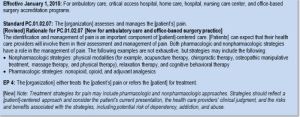The Joint Co
The “Joint” in “Joint Commission” does not stand for “joint” as in medical marijuana. Rather:
Joint Commission accreditation and certification is recognized nationwide as a symbol of quality that reflects an organization’s commitment to meeting certain performance standards…
Our mission: To continuously improve health care for the public, in collaboration with other stakeholders, by evaluating health care organizations and inspiring them to excel in providing safe and effective care of the highest quality and value.
The Revisions to the Provision of Care, Treatment, and Services standard PC.01.02.07 – which addresses pain management – is effective January 1, 2015:
Following an extensive literature review, The Joint Commission revised the rationale and added a note to element of performance (EP) 4. Clinical experts in pain management provided feedback on these revisions and guidance on the future direction of pain management. The experts affirmed that treatment strategies may consider both pharmacologic and nonpharmacologic approaches. In addition, when considering the use of medications to treat pain, organizations should consider both the benefits to the patient, as well as the risks of dependency, addiction, and abuse of opioids.
John Weeks, publisher of the Integrator Blog News & Reports, writes of the efforts made by integrative medicine clinicians and professionals to bring this development to fruition.
Arguably, the inclusion of non-pharmacological, CAM approaches in a major, national pain management standard, suggests that the informed consent obligation that medical doctors have, both legally and ethically, now requires them to include discussion of complementary therapy approaches to patients who have pain. Inadequate informed consent is a second theory of medical malpractice.
Our healthcare lawyers track integrative medicine developments so we can counsel our integrative oncology and other integrative medicine doctors, acupuncturists, and other clinicians on legal developments relevant to their practice and clinic.

Contact our healthcare law and FDA attorneys for legal advice relevant to your healthcare venture.
Contact Us


